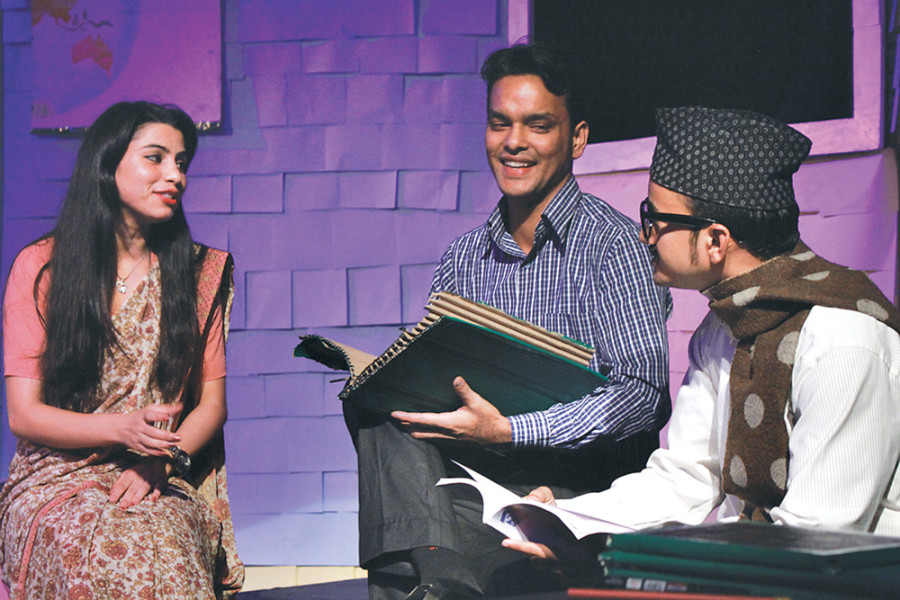Entertainment
Upiya ko Nibandha: A heartbreaking comedy
Upiya ko Nibandha, a play by director Kedhar Shrestha, highlights the psychology of a teacher and his students in a traditional Nepali classroom and explores the relationships between them. The play, which is a part of the National Children Theatre Festival, is currently being staged at Theatre Mall, Sundhara.
Shaleen Shah
Upiya ko Nibandha, a play by director Kedhar Shrestha, highlights the psychology of a teacher and his students in a traditional Nepali classroom and explores the relationships between them. The play, which is a part of the National Children Theatre Festival, is currently being staged at Theatre Mall, Sundhara.
The play starts with an unsettling scene, portraying students standing in formation wearing regular masks, and a teacher holding a drum and wearing a distinctive, macabre mask. The teacher beats on the drums as the students follow every command. As the plot continues, the antagonist is identified as a strict and domineering “Nepali Sir” who carries a stick and doesn’t hesitate to physically or verbally abuse his students on the slightest provocation.
The protagonist is a seemingly tender hearted, unassertive school boy named Mahesh. The play revolves around how he responses to Nepali sir’s nibandha (essay) assignments and the consequences he faces for it.
Mahesh devises an ingenious yet unorthodox method to write his essays which infuriates Nepali Sir. He punishes Mahesh multiple times, even though he was the only prompt student. The reason? Mahesh’s creativity didn’t follow through with his standards.
Nepali Sir is a rigid man with a tunnel vision, and does not allow any creativity in the class. Slight deviations from his standards would result in harsh punishments which included the classic “kukhura bann” (sit like a chicken), the ruler slap, the ear twist and severe verbal abuse.
The students report Nepali sir’s behaviour to the principal, which unfolds a series of events which leads Nepali sir to reconsider his teaching methods. At the end of the play, Mahesh repeats his eccentric method on writing the essay. Nepali sir is, as usual, aggravated. As he proceeds to strike Mahesh’s palm with the stick, he meets Mahesh’s saddened eyes, and pauses. For the first time, Nepali sir drops his stick.
At the end of the play, the scene of students in formation wearing masks reappears. Only this time, Nepali sir takes off his macabre, domineering mask, ponders his old ways as he looks at it, and, after some thought, replaces it with the regular mask the students are wearing. Upiya ko Nibandha is a comedy, capable of twisting bellies with laughter. But in between the laughs, it leaves viewers with a pressing feeling of urgency and sadness which comes with the realisation of the somber reality of such unfortunate Nepali students.
The play is slated to continue until July 17 every day at 5.30 pm at Theatre Mall.




 17.9°C Kathmandu
17.9°C Kathmandu










